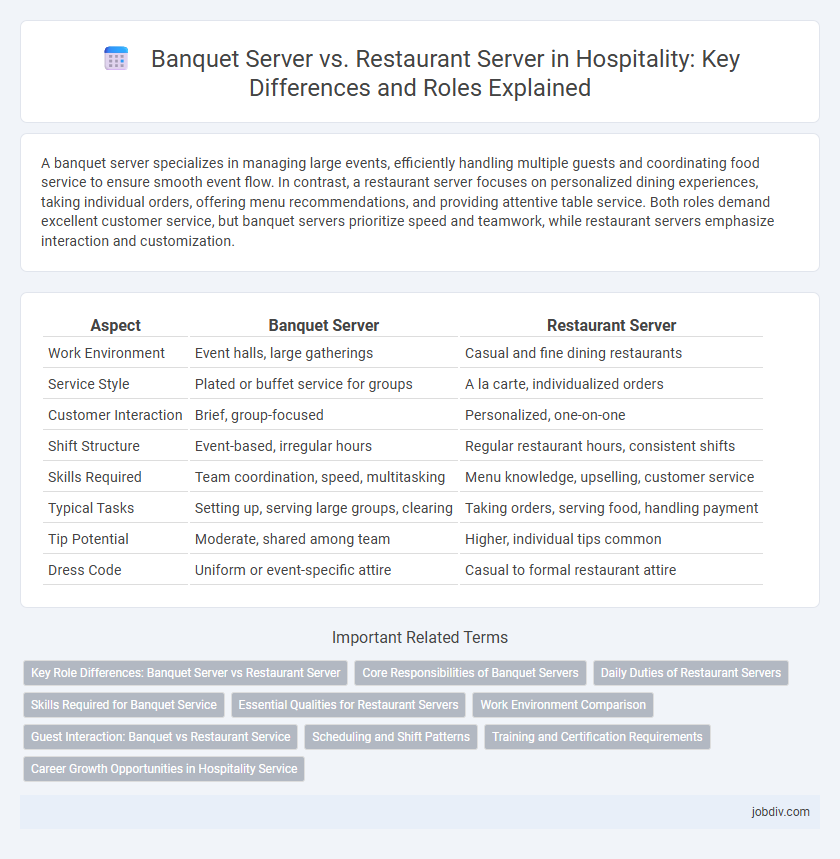A banquet server specializes in managing large events, efficiently handling multiple guests and coordinating food service to ensure smooth event flow. In contrast, a restaurant server focuses on personalized dining experiences, taking individual orders, offering menu recommendations, and providing attentive table service. Both roles demand excellent customer service, but banquet servers prioritize speed and teamwork, while restaurant servers emphasize interaction and customization.
Table of Comparison
| Aspect | Banquet Server | Restaurant Server |
|---|---|---|
| Work Environment | Event halls, large gatherings | Casual and fine dining restaurants |
| Service Style | Plated or buffet service for groups | A la carte, individualized orders |
| Customer Interaction | Brief, group-focused | Personalized, one-on-one |
| Shift Structure | Event-based, irregular hours | Regular restaurant hours, consistent shifts |
| Skills Required | Team coordination, speed, multitasking | Menu knowledge, upselling, customer service |
| Typical Tasks | Setting up, serving large groups, clearing | Taking orders, serving food, handling payment |
| Tip Potential | Moderate, shared among team | Higher, individual tips common |
| Dress Code | Uniform or event-specific attire | Casual to formal restaurant attire |
Key Role Differences: Banquet Server vs Restaurant Server
Banquet servers specialize in large-scale events, managing buffet setups, plated dinners, and coordinating service for multiple guests simultaneously, often requiring teamwork and timing precision. Restaurant servers focus on individual table service, engaging with guests to provide personalized menu recommendations, order accuracy, and timely meal delivery in a more intimate dining environment. The banquet server's role demands adaptability to varying event formats, while restaurant servers emphasize consistent guest interaction and menu knowledge.
Core Responsibilities of Banquet Servers
Banquet servers specialize in managing large-scale events, ensuring timely setup, serving plated meals or buffet-style dishes, and coordinating with event staff to meet guest expectations. Their core responsibilities include clearing tables efficiently between courses, replenishing beverages, and accommodating special requests to maintain service flow. Unlike restaurant servers who handle individual tables, banquet servers must adapt to dynamic environments and collaborate closely with banquet managers and kitchen staff.
Daily Duties of Restaurant Servers
Restaurant servers manage daily duties including taking customer orders, delivering food and beverages, and handling payment transactions efficiently. They ensure a seamless dining experience by coordinating with kitchen staff, maintaining tables, and addressing guest needs promptly. Unlike banquet servers who serve large groups during events, restaurant servers provide personalized service to individual or small groups in a restaurant setting.
Skills Required for Banquet Service
Banquet servers require exceptional multitasking abilities, strong communication skills, and the capacity to manage large groups efficiently under time constraints, differing from restaurant servers who focus more on individual table service and personalized customer interaction. Expertise in formal table settings, knowledge of event flow, and the ability to coordinate seamlessly with kitchen and event staff are critical skills unique to banquet service. Proficiency in handling high-volume service with attention to detail and maintaining professionalism during large-scale events distinguishes banquet servers in the hospitality industry.
Essential Qualities for Restaurant Servers
Restaurant servers require exceptional communication skills, a keen attention to detail, and the ability to multitask efficiently during high-volume service. Unlike banquet servers who focus on large group events, restaurant servers must provide personalized attention, anticipate guest needs, and maintain a polished knowledge of the menu to enhance the dining experience. Strong interpersonal skills, agility in handling orders, and upbeat professionalism are essential qualities that distinguish effective restaurant servers in fast-paced environments.
Work Environment Comparison
Banquet servers often work in event spaces like hotels or convention centers, handling large groups during functions such as weddings or corporate gatherings, where teamwork and adaptability are critical due to fluctuating guest volumes. Restaurant servers operate in more consistent, smaller-scale dining settings with regular shifts, fostering routine interaction with returning patrons and a steadier pace of service. The banquet environment demands flexibility for variable hours and event setups, whereas restaurant servers typically enjoy more predictable schedules and defined workstations.
Guest Interaction: Banquet vs Restaurant Service
Banquet servers engage with guests primarily during large, pre-planned events, requiring efficient coordination to serve meals and beverages to many guests simultaneously, often with limited individual interaction. Restaurant servers provide personalized, continuous service throughout the dining experience, fostering direct communication to accommodate specific guest preferences and ensure satisfaction. The key difference lies in banquet servers managing group dynamics and timing, while restaurant servers focus on tailored, one-on-one guest engagement.
Scheduling and Shift Patterns
Banquet servers typically work on event-driven schedules with variable shifts that may include evenings, weekends, or holidays to accommodate special functions, unlike restaurant servers who often have more consistent, routine shift patterns aligned with daily meal times. Banquet shifts can be longer and less predictable, requiring flexibility for setup, event duration, and breakdown, whereas restaurant servers usually follow fixed shifts with consistent peak hours during lunch and dinner services. The scheduling complexity in banquet serving demands adaptability to fluctuating guest counts and event timings, contrasting the steady flow and staffing needs of restaurant servers.
Training and Certification Requirements
Banquet servers require specialized training in event coordination, table setup, and large-group service etiquette, often completing certifications in food safety and alcohol handling specific to banquet settings. Restaurant servers typically focus on point-of-sale operation training and customer service skills, with certifications emphasizing health codes and allergen awareness in fast-paced dining environments. Both roles benefit from certifications such as ServSafe, but banquet servers often undergo more extensive training tailored to formal events and banquets.
Career Growth Opportunities in Hospitality Service
Banquet servers often gain experience in large-scale event management and teamwork, offering pathways to supervisory roles in event coordination or banquet management. Restaurant servers develop strong customer service skills and menu knowledge, which can lead to positions such as floor manager or sommelier. Both career paths provide valuable hospitality experience, but banquet servers may access broader event planning opportunities, while restaurant servers typically advance within food and beverage operations.
Banquet Server vs Restaurant Server Infographic

 jobdiv.com
jobdiv.com